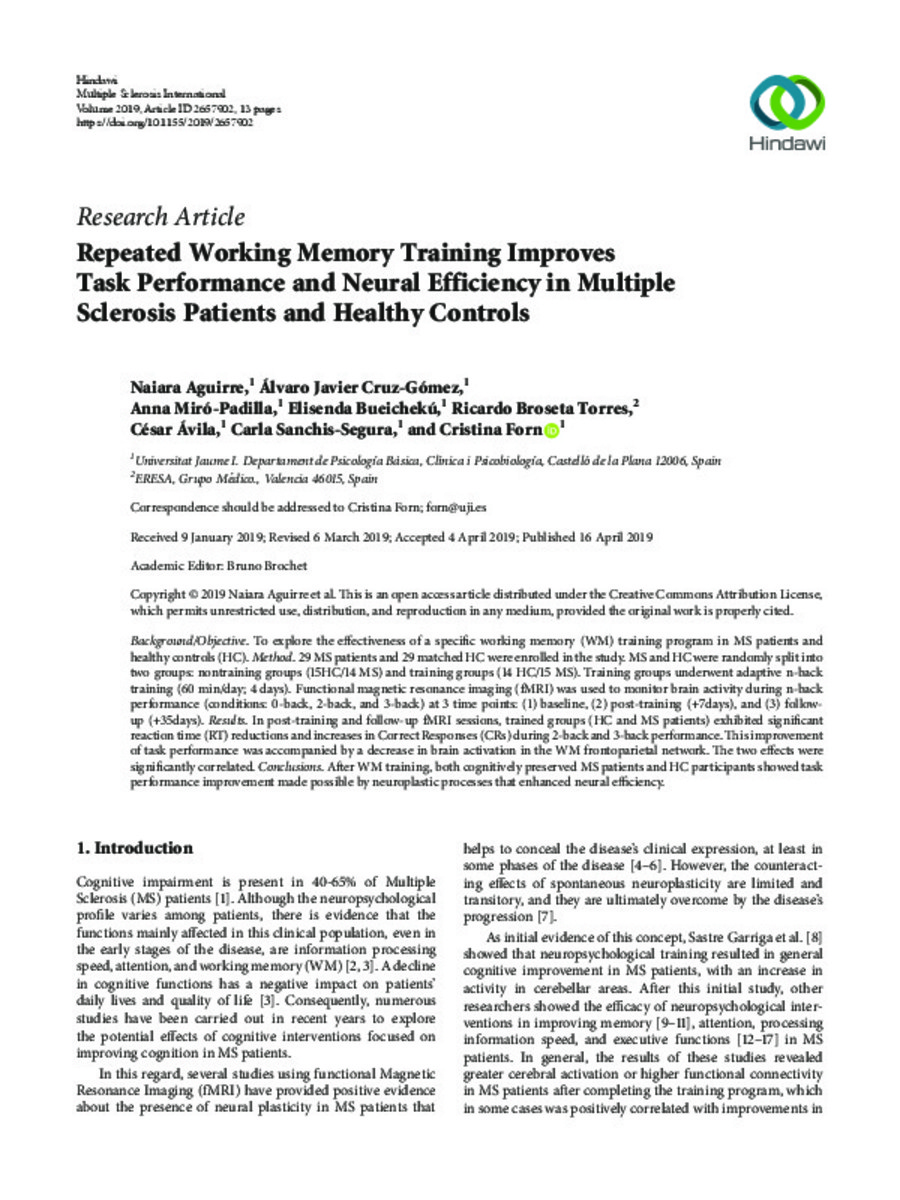Mostrar el registro sencillo del ítem
Repeated Working Memory Training Improves Task Performance and Neural Efficiency in Multiple Sclerosis Patients and Healthy Controls
| dc.contributor.author | Aguirre, Naiara | |
| dc.contributor.author | Cruz Gómez, Álvaro Javier | |
| dc.contributor.author | Miró-Padilla, Anna | |
| dc.contributor.author | Bueichekú, Elisenda | |
| dc.contributor.author | Broseta Torres, Ricardo | |
| dc.contributor.author | Avila, Cesar | |
| dc.contributor.author | Sanchis-Segura, Carla | |
| dc.contributor.author | Forn, Cristina | |
| dc.date.accessioned | 2019-06-19T10:02:53Z | |
| dc.date.available | 2019-06-19T10:02:53Z | |
| dc.date.issued | 2019 | |
| dc.identifier.citation | AGUIRRE, Naiara, et al. Repeated Working Memory Training Improves Task Performance and Neural Efficiency in Multiple Sclerosis Patients and Healthy Controls. Multiple sclerosis international, 2019, vol. 2019. | ca_CA |
| dc.identifier.issn | 2090-2654 | |
| dc.identifier.issn | 2090-2662 | |
| dc.identifier.uri | http://hdl.handle.net/10234/182874 | |
| dc.description.abstract | Background/Objective. To explore the efectiveness of a specifc working memory (WM) training program in MS patients and healthy controls (HC). Method. 29 MS patients and 29 matched HC were enrolled in the study. MS and HC were randomly split into two groups: nontraining groups (15HC/14 MS) and training groups (14 HC/15 MS). Training groups underwent adaptive n-back training (60 min/day; 4 days). Functional magnetic resonance imaging (fMRI) was used to monitor brain activity during n-back performance (conditions: 0-back, 2-back, and 3-back) at 3 time points: (1) baseline, (2) post-training (+7days), and (3) followup (+35days). Results. In post-training and follow-up fMRI sessions, trained groups (HC and MS patients) exhibited signifcant reaction time (RT) reductions and increases in Correct Responses (CRs) during 2-back and 3-back performance.Tis improvement of task performance was accompanied by a decrease in brain activation in the WM frontoparietal network. Te two efects were signifcantly correlated. Conclusions. Afer WM training, both cognitively preserved MS patients and HC participants showed task performance improvement made possible by neuroplastic processes that enhanced neural efciency. | ca_CA |
| dc.format.extent | 14 p. | ca_CA |
| dc.format.mimetype | application/pdf | ca_CA |
| dc.language.iso | eng | ca_CA |
| dc.publisher | Hindawi | ca_CA |
| dc.relation.isPartOf | Multiple Sclerosis International Volume 2019, Article ID 2657902 | ca_CA |
| dc.rights | Copyright © 2019 Naiara Aguirre et al. Tis is an open access article distributed under the Creative Commons Attribution License, which permits unrestricted use, distribution, and reproduction in any medium, provided the original work is properly cited. | ca_CA |
| dc.rights | Atribución 4.0 Internacional | * |
| dc.rights.uri | http://creativecommons.org/licenses/by-sa/4.0/ | * |
| dc.title | Repeated Working Memory Training Improves Task Performance and Neural Efficiency in Multiple Sclerosis Patients and Healthy Controls | ca_CA |
| dc.type | info:eu-repo/semantics/article | ca_CA |
| dc.identifier.doi | https://doi.org/10.1155/2019/2657902 | |
| dc.relation.projectID | PSI2015-67285-R ; UJI B2017-05 ; FPU16/01525 | ca_CA |
| dc.rights.accessRights | info:eu-repo/semantics/openAccess | ca_CA |
| dc.relation.publisherVersion | https://www.hindawi.com/journals/msi/2019/2657902/ | ca_CA |
| dc.type.version | info:eu-repo/semantics/publishedVersion | ca_CA |
Ficheros en el ítem
Este ítem aparece en la(s) siguiente(s) colección(ones)
-
PSB_Articles [1312]
Articles de publicacions periòdiques
Excepto si se señala otra cosa, la licencia del ítem se describe como: Copyright © 2019 Naiara Aguirre et al. Tis is an open access article distributed under the Creative Commons Attribution License,
which permits unrestricted use, distribution, and reproduction in any medium, provided the original work is properly cited.








